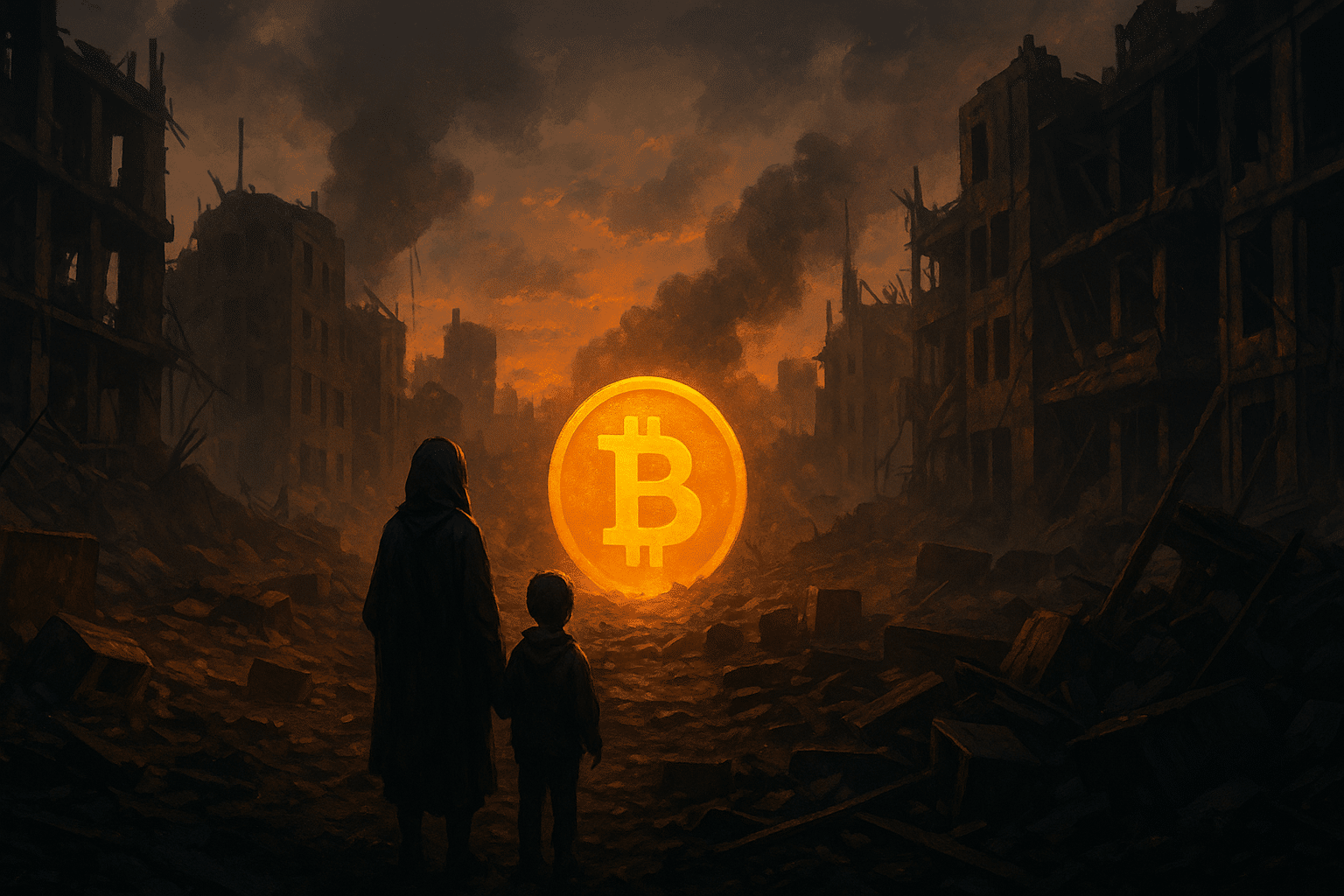Crypto in Conflict Zones: How Digital Money Helps People in War and Sanctions
In many parts of the world, life becomes very hard when war happens or when a country gets heavy sanctions. Banks stop working properly, money loses value very fast, and people can not move funds safely. In these times, crypto becomes a small hope for many families and groups.
Crypto is not magic. It does not solve every problem. But in places where banks close or break, where borders have soldiers and life is unsafe, digital money sometimes becomes the only way to send or save money. Many people in crisis regions say crypto helps them buy food, send money to family, or move funds when running away from danger.
This is why crypto is getting famous in conflict zones like Ukraine, Gaza, Afghanistan, Syria, and sanctioned places like Iran and Venezuela. It gives some control back to normal people when old systems are failing.
Why Crypto Becomes Important in War Zones
When war starts, normal banks face many issues. Branches close fast. ATMs empty. The Internet or power goes down sometimes. People face danger outside, so they can not visit banks even if they want to.
Crypto can still move across a phone or laptop when banks stop. Also, crypto does not care about borders. This is very important for people who need to leave home quickly and go to another country.
Also, many times during war, cash becomes short. Sometimes people want to hold something that does not lose value quickly. Local currency can drop every day. Crypto becomes a safer option for some families who want to protect their savings. Below are four simple ideas why crypto becomes useful in wartime.
Broken Banks and Cash Problems
In war, banks sometimes shut down overnight. This already happened in Afghanistan when the government changed. People could not take cash because banks were frozen and ATM machines had no money left.
Crypto does not need a bank building to work. Even a small phone can hold and send crypto. Families in damaged areas say this helped them get funds from family abroad when banks were not working.
But also, there is a risk. If the internet is down, then crypto becomes hard to use. So it is not perfect but it helps many times when banks stop.
Rising Inflation and Currency Collapse
War destroys economy very fast. Shops close, businesses stop working, and governments print more money to pay for things. This makes regular money lose value. In Venezuela and Syria, inflation got so high that people needed huge bundles of local money just to buy food.
Many start using stablecoins like USDT because the value stays stable. They keep the money in digital form so it does not disappear in one night from inflation.
No Trust in Government Money
During war or sanctions, many people stop trusting government banks. Some countries freeze bank accounts. Some block foreign money transfers. And sometimes the government prints too much cash.
Crypto works without a central bank. People can control their own keys and wallet. This gives them a feeling of safety when they do not trust officials or banks.
Some people in places like Lebanon, Ukraine, and Gaza said crypto helped them when banks limited withdrawals or stopped money transfers.
Fast Transfers When Borders Are Closed
War makes borders strict. Banks may block international wires. But crypto transfers do not ask border police or a bank clerk for permission. People escape war zones and carry their funds in a phone or even a memory phrase in mind.
For example, some Ukrainian refugees moved funds across Europe fast using stablecoins and Bitcoin, because normal bank wire was slow and uncertain due to the war.
Below is a table comparing transfer options.
| Method | Speed | Good in War | Notes |
| Bank wire | Very slow when crisis | Often blocked | High fees and delays |
| Cash | Hard to carry | Dangerous | Can be stolen or lost |
| Crypto | Very fast | Works across borders | Needs phone and internet |
How People Use Crypto During Conflict
When war or sanctions strike, people use crypto in many simple ways. People send funds to their families. People donate to help victims. Refugees carry crypto instead of gold or big bags of cash. Volunteers pay for fuel or shelter using digital money when banks stop.
Also many aid groups use crypto because it reaches faster than bank systems. Even small online communities collect funds for medical aid and move it fast to areas where people need help.
Some stores in crisis areas also accept crypto, but not everywhere. Exchange services sometimes let people convert crypto to local money so they can buy food or transport.
Below are some real usage examples.
| Use Case | Example |
| Send money fast | Ukrainians receive help from abroad |
| Store savings | Venezuelans hold USDT instead of bolivar |
| Escape war | Afghan families bring crypto to new country |
| Aid donations | Crypto raised for Ukraine and Gaza help funds |
Crypto Use in Sanctioned Countries
Sanctions make life very difficult for normal people. When a country faces sanctions, banks can not connect to the world banking system. Credit cards stop working. Government money sometimes drops in value really fast. So people search for other ways to save money or move money.
In many sanctioned places, crypto starts to grow because it gives some freedom. It is not always legal, and there are big risks. But many families still use it just to survive and feed their kids. So it becomes like a lifeline in some cases.
Some countries try to use crypto on the government level too. Sometimes they want to bypass restrictions. But global agencies keep watching and try to stop illegal use. Still, on street level, small families use it mainly to survive daily life.
Here are examples of crypto use in sanction-heavy countries:
| Country | Situation | Crypto Use |
| Iran | Many sanctions | Mining and stablecoin payments |
| Russia | Global sanctions after conflict | People use crypto to move funds abroad |
| Venezuela | Economic collapse and sanctions | USDT used for food, rent, medicine |
| North Korea | Hard sanctions | Government accused of hacks to get crypto |
Russia and Sanctions
After sanctions on Russia increased, many people found it hard to send money abroad. Banks got removed from the SWIFT system, so international money transfers became really slow or almost impossible sometimes. Some Russians turned to crypto to move money to Europe or Asia.
Also, some businesses use stablecoins to continue global trade. In some cases, small companies paid workers abroad with USDT or Bitcoin. But also, there are strict laws in Russia for crypto. So it is not simple or safe.
Crypto does not replace the whole banking system for Russia, but it has helped a little for people stuck between rules and war effects.
Iran and Crypto Mining and Payments
Iran faced sanctions for many years. So the economy suffered, and banks had many blocks. Iran became known for its large crypto mining industry. The government sometimes supports miners because they bring foreign crypto, then convert it to money.
People also use stablecoins to buy products from abroad, since many stores can not accept Iran bank payments. But internet cuts and strict police also make things risky. So crypto helps but not without problems.
North Korea and Hacking Claims
North Korea is a different case. People inside the country do not use crypto widely to survive like in Venezuela. But big reports say government hackers steal crypto from global projects to get money. This is because sanctions block them from world banking.
So North Korea uses crypto not mainly for normal citizens but for government advantage. Many news say hack groups like Lazarus attacked crypto exchanges and took funds. This shows how crypto also gets used in dark ways in extreme sanction countries.
How Crypto Helps People Cross Borders and Escape War
In wartime, many families leave their homes very quickly. They can not carry gold or too much cash. Soldiers or thieves can take it. Banks sometimes freeze cards or do not work in other countries. So crypto becomes a way to take savings safely.
Some refugees say they remembered the wallet passphrase in their head and moved to a new country with nothing in their pockets, but still had money when they reached the border. This makes crypto very unique. No bank can block memory.
Some refugees also receive help from family in other countries through crypto and then change it to local money when they arrive in a safe place. This makes life a little easier during a very hard time.
Future of Crypto in Crisis Regions
Future looks mixed, but maybe brighter for crypto in crisis places. Many aid groups test stablecoins for charity. Some refugee programs explore blockchain ID so money can go to real people, not middlemen.
In countries with broken banks, stable digital money can maybe become the main tool someday. But for that internet must be safe, and education must grow for crypto wallets.
Maybe governments will use digital currency in future wars to protect the economy. Maybe big organizations like the UN start using blockchain for food and shelter support. Many ideas are coming.
But technology must focus on safety and easy use. Because many people in crisis do not know deep tech. Systems must be simple, or they will not help in real life.
Conclusion
Crypto has become a strong tool in war-torn and sanctioned regions. It helps people when banks fail, borders close, and money loses value. It gives fast support and lets families move funds safely. Stablecoins become the main option for saving.
But there are risks too. Scams, internet shutdown, price swings, and hackers. And also big politics around crypto use in conflict. So crypto is not perfect, but it gives power when everything else breaks.
The world is still learning how to use digital currency in an emergency. In the coming years, crypto will probably become a bigger part of global humanitarian systems. Technology plus human hope always finds a new way to survive.
Frequently Asked Questions
Why do people in war zones use crypto
Because banks stop working or money loses value and crypto still moves fast and safe most times.
Does crypto help avoid sanctions
Sometimes but mostly normal families use it to survive not big illegal groups. Governments watch very close.
What crypto is used most in crisis
Stablecoins like USDT and also Bitcoin sometimes.
Is crypto safe in war
It can be helpful but still risky if internet down or scams appear.
Will crypto become main money in war zones
Maybe stablecoins will grow but still need power and internet to work.
Glossary
Crypto
Digital money that works online without a bank.
Blockchain
A system that records transactions on many computers so it can not be changed easy.
Stablecoin
A type of crypto that keeps steady value like US dollar (example USDT, USDC).
Bitcoin
First and most famous cryptocurrency used everywhere.
Sanctions
Rules by other countries that block trade and banking for a nation.
Inflation
When money loses value and prices keep rising fast.
Summary
Crypto becomes very important in war zones and sanctioned countries. When banks stop working, or local money crashes, or people need to run from danger, crypto gives small hope. It lets people move money fast, save value during inflation, and receive donations from world in minutes.
Ukraine used crypto donations to help soldiers and hospitals. Venezuela families use USDT for food and rent. Iran and Russia also use crypto under sanctions, sometimes in good ways and sometimes in ways that worry other countries.
Crypto is not perfect. There are risks like scams, internet shutdown, and price changes. But still crypto helped many families survive hard times when old systems failed. Future may see more humanitarian crypto tools, more stablecoins use, and more global help on blockchain.
Crypto in crisis is not just money. It is small freedom and safety in very dark moments.
Read More: Crypto in Conflict Zones: How Digital Money Helps People in War and Sanctions">Crypto in Conflict Zones: How Digital Money Helps People in War and Sanctions




